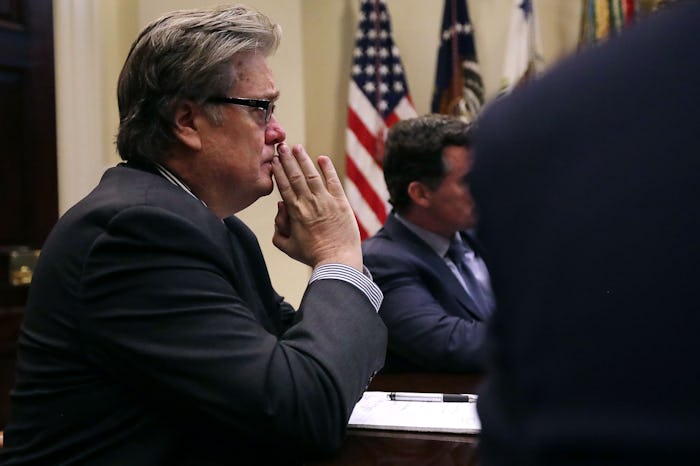News

What Will Bannon Do In His New Position?
On Monday, President Donald Trump appointed his chief White House strategist and former Trump campaign chief executive officer Steve Bannon as a member of the National Security Council. Bannon's new seat at the NSC table is as controversial as Trump's removal of the director of national intelligence and the chairman of the Joint Chiefs of Staff from the Principals Committee. As the executive chairman for far-right conservative website Breitbart, he seems like an odd duck to bring to the table, so what will Steve Bannon do on the National Security Council?
According to The Military Times, Bannon served in the U.S. Navy for seven years during the 1970s and '80s as a surface warfare officer; he was also special assistant to the Pentagon's Chief of Naval Operations. But that's about the extent of Bannon's military resume; he was an investment banker for Goldman Sachs and then in the 1990s, entered the entertainment industry as a producer.
As one of the founding board members of self-described alt-right news site Breitbart (alt-right is a term used to describe ideals of white supremacy and overlaps with Neo-Naziism), Bannon took over after founder Andrew Breitbart died in 2012. Aside from his brief career as a naval officer and a running by-line of far-right commentary at Breitbart, he was the CEO of Trump for America, so why exactly is he on the National Security Council again? The White House did not immediately respond to Romper's request for comment.
First, what is the National Security Council? In a nutshell, these are the leaders sitting around the table in the White House Situation Room that advise the president on matters of national security. If you were a fan of West Wing, it's where President Bartlett challenged his military leaders on the "virtue of proportional response." On House of Cards, President Underwood led a disastrous mission into the Jordan Valley from his hot seat in the Situation Room.
In real life, the National Security Council was the group that gathered around President Obama in the Situation Room as Osama bin Laden was killed by U.S. Special Forces in Pakistan. Obama had merged the NSC with the Homeland Security Council into a single National Security Staff during his first term in office. On Monday, Trump undid that merge and did something unprecedented by putting a political strategist on the National Security Council. Kelly Magsamen, writing for The Atlantic explained just why this is concerning:
Now, politics finding its way into a president’s national-security decision-making is nothing new. But it rarely (if ever) gets a seat in the White House Situation Room—for good reason. To place a purely political operative on the NSC—alongside actual Cabinet members with national-security responsibilities or expertise—is an unprecedented move with profound implications for how national-security policies are developed and executed. To be clear, that concern is not confined to Steve Bannon. This would be the case no matter who it was.
But in addition of putting a White House strategist on the NSC, it's also Steve Bannon. This is the same man that former KKK Grand Wizard and white supremacist David Duke called "excellent" when Trump announced Bannon as a chief White House strategist while president-elect, according to The Hill. Bannon also got a ringing endorsement from the American Nazi Party last November.
So the short answer is: We don't really know what Steve Bannon will actually be doing on the National Security Council. And given that the Trump Administration has put transparency at the bottom of its priorities — you can't even find Steve Bannon on the White House website when you search for his name — the American people will probably never know exactly what Bannon will be doing in these key meetings on national security with the president.